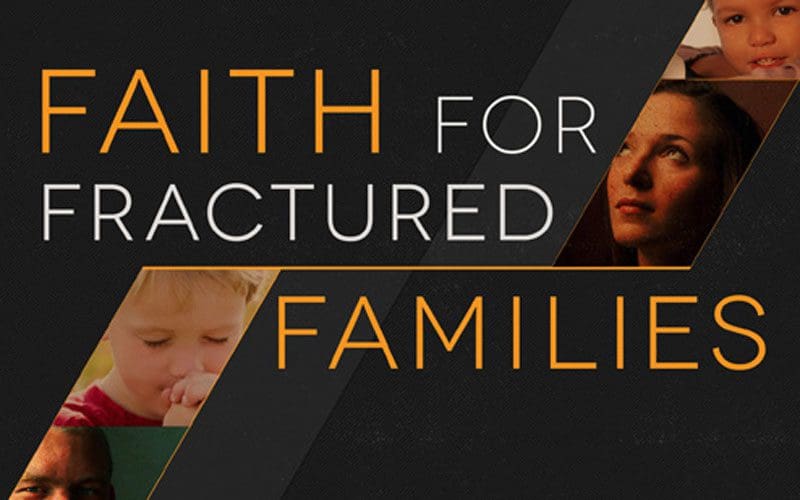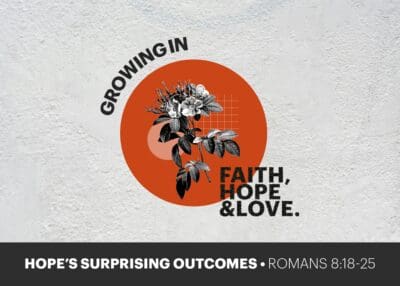So [Sarah] said to Abraham, “Cast out this slave woman with her son, for the son of this slave woman shall not be heir with my son Isaac.” Genesis 21:10
A quick review of the story: God had promised that his blessing would come to people from every nation on earth through an offspring of Abraham. Abraham and Sarah were aging and they had no child, so Sarah gave her servant Hagar to Abraham so a child would be born through her.
Although this would not have been unusual in the culture, it was never God’s design. The result was an emotional triangle. Abraham was pulled between his love for his wife and his love for his son. This fractured family was plunged into a web of conflicting loyalties and hidden resentments. The person who is caught in the middle of all this was Ishmael, the son born to Abraham through Sarah’s servant Hagar. So today we are looking at the story through the eyes of Ishmael, the troubled son.
The message today is a story of hope for every person who struggles with conflicts that have their root in your family of origin. We’re going to look at four snapshots of Ishmael’s troubled life. We will see how his life imploded in his teenage years. We will see how God met him and blessed him, and how he can do the same for the most troubled person listening to this message today.
Ishmael’s Troubled Life
ISHMAEL’S TROUBLED LIFE:
- Challenges in his temperament
“He shall be a wild donkey of a man, his hand against everyone and everyone’s hand against him…” Genesis 16:12
All of us know what it is for the flesh to pull us in one direction or another. But the prophecy about Ishmael reminds us that some people struggle with powerful impulses that are rooted in their temperament more than others.
Ishmael was a wild donkey of a man. He was wild at heart. That was not said of Isaac, who seems to have been of a calmer temperament.
Some of you will identify with Isaac: You have your sins and your temptations, like everyone else, but God has given you a calmness of spirit. The challenge for you is that it is easy to become comfortable and self-righteous.
But others will identify with Ishmael. There is a conflict that seems always to be raging within you. Powerful impulses rise up from within your soul.
You find yourself torn, pulled apart. Matthew Henry says:
Those who have turbulent spirits often have troublesome lives [1]
That was true of Ishmael. He always felt that people were against him. His default position was that he was against everyone else. He was suspicious, slow to trust.
Some people have harder battles than others. Remembering that will help you be more compassionate towards other believers. You do not know the intensity of your brother or sister’s battle. You may say, “Well, why don’t they just deal with that?” But if you faced the intensity of struggle that they experience, you might not find it so easy either.
ISHMAEL’S TROUBLED LIFE:
- Tensions in his family
Abraham made a great feast on the day that Isaac was weaned. But Sarah saw the son of Hagar the Egyptian, whom she had borne to Abraham, laughing. Genesis 21:8-9
Abraham was 86 years old when Ishmael was born, and he was 100 when Isaac came along. That means that Ishmael was 14 when Isaac was born.
Try to put yourself in the shoes of this fourteen-year-old boy. Ishmael’s father loves him, but Ishmael’s father does not love Ishmael’s mother. Abraham loves Sarah to whom he is married. Sarah is not Ishmael’s mother and Ishmael does not get along with Sarah.
Hagar is Ishmael’s birth mother. Hagar loves Ishmael, but she is not in a position to care for him. That role belongs to Sarah, Abraham’s wife, and Ishmael’s mother is her servant. So Ishmael grows up in a home where there is constant tension. This unhappy world of resentments is the only life he has ever known.
As Ishmael grows up, he learns about the God of the Bible and the great promise God had made to his father, Abraham, that all nations would be blessed through the offspring of Abraham (Genesis 12:1-3). Ishmael is Abraham’s offspring. There is no other…
Then one day news comes that Dad and Sarah are expecting. This is not good news for Ishmael. When Sarah falls pregnant, everyone is laughing… except for Ishmael! From that moment on, all the attention is on Isaac. The word is that this is the boy through whom the blessing will come, not Ishmael: “Isaac, Isaac, Isaac! Always Isaac—all the wonderful things that Isaac is going to do.” No one takes much notice of fourteen-year-old Ishmael.
Some of you know about this. You have a gifted sister or brother—they always seem to shine. Your sister has charm and looks and brains. Your brother is the great achiever, and what’s left for you? Favoritism is thinly disguised or perhaps not even disguised at all. Someone else had the blessing… and then there was you.
Ishmael puts up with it for a couple of years or so. Then on the day that Isaac was weaned, Abraham threw a great feast (16:8). It’s amazing how often tension in a family can erupt when everyone is together for what’s supposed to be a celebration. Mother’s Day, Father’s Day, Christmas, Thanksgiving, Easter—the family is together and we just want everyone to be happy. But tensions that have simmered, have a way of getting to the surface, especially when there are teenagers in the house.
Abraham holds a feast, and Ishmael was not happy. (He is just like the elder brother in the story that Jesus told). “Isaac, Isaac, Isaac. Always Isaac.” Ishmael despised him, mocked him, and laughed at him.
Sarah saw what was happening and she said: “Ishmael must go!” Sarah said to Abraham, “Cast out this slave woman with her son, for the son of this slave woman shall not be heir with my son Isaac” (Genesis 21:10).
That didn’t worry Ishmael: “Dad is in my corner. I’m his firstborn. He’ll stand up for me.” Imagine Ishmael’s astonishment when the next morning Abraham comes to him with a heavy heart and says “Son, you have to go!”
The family is torn apart. That must have raised huge questions for Ishmael: “How can God love me if he blesses my brother and takes me away from my father? The God my father believes in certainly doesn’t seem to care about me!”
ISHMAEL’S TROUBLED LIFE:
- Questions about his existence
So [Sarah] said to Abraham, “Cast out this slave woman with her son, for the son of this slave woman shall not be heir with my son Isaac.” Genesis 21:10
Put yourself in Ishmael’s shoes. He is the focal point of all the trouble in this fractured family. I speculate here, but there must have been times when he had questions that went to the heart of his own existence: “I was a mistake. I was never meant to be. I seem to be a trouble to everyone. It would be better for everyone, if I had never been born.”
What do you say to a boy or a girl whose life began as the result of a rape?
What do you say to a teenager who came into being as a result of an affair? What do you say to the child who says, “I am the problem here? If I didn’t exist, this family might have a chance. It’s all my fault…”
These are real questions, and they’re wonderfully addressed right here in story of Ishmael. There’s good reason for describing Ishmael as “the troubled son.” Put together the challenges of his temperament with the tensions in his family, and questions about his existence. You can see that what we have here is one troubled, messed up teenager.
ISHMAEL’S TROUBLED LIFE:
- Struggles with God’s providence
Abraham rose early in the morning and took bread and a skin of water and gave it to Hagar, putting it on her shoulder, along with the child, and sent her away… Genesis 21:14
The striking thing is how little Abraham provides for his son. He was a rich man—Abraham had camels, donkeys, and many servants, yet here he is sending his firstborn out into the desert, and what does he provide? A load of bread and a skin of water. How long is that going to last?
And what about protection? The desert was the most dangerous place you could go in those days. Going out into the desert then was like going into the city now. Abraham could easily have sent a small security force with Hagar and Ishmael. But he does not. The firstborn son and his mother are sent out into the desert with a loaf of bread and a skin of water.
Genesis tells us that Abraham did not want to send them away: “The thing was very displeasing to Abraham on account of his son” (Genesis 21:11). But the reason he did this is that God spoke to Abraham about it directly. “God said to Abraham, ‘be not displeased because of the boy and because of the slave woman. Whatever Sarah says to you, do as she tells you’” (Genesis 21:11). Abraham did not want to send Ishmael away. He wanted to keep him at home.
Knowing this, it is reasonable to assume that Abraham’s natural instinct would have been to send Ishmael away with an abundance of food and with some servants for protection. So, why send him away with only a loaf of bread and a skin of water?
“Whatever Sarah says to you, do as she tells you.” I imagine the conversation between Abraham and Sarah the night before Abraham sends Ishmael away: “I’m going to send Ishmael away in the morning, Sarah. What provisions should I send with him?”
“Nothing. I don’t want a single grain of Isaac’s inheritance to leave with that slave girl and her son’s stuff in the morning.”
Now it seems that God himself is against Ishmael. A loaf of bread and a skin of water for two people? God must be sending both of them out into the desert to die! But here’s the amazing thing… God’s hand was in the limited supply. This would be the means of Hagar and Ishmael encountering God. Follow the story with me…
Hagar departed and wandered in the wilderness of Beersheba. When the water in the skin was gone, she put the child under one of the bushes. Then she went and sat down opposite him a good way off, about the distance of a bowshot, for she said, ‘Let me not look on the death of the child.’ And as she sat opposite him, she lifted up her voice and wept. Genesis 21:14-16
Ishmael’s strength gives out in the desert. The boy lies in the sand under a bush. His mother is at breaking point. The situation is hopeless. There is nothing more she can do. She lifts up her voice and weeps.
For Ishmael it looks like the end of the road. His father can’t keep him. His mother can’t support him. His own strength is gone. He can’t go on. Then we read these remarkable words, “and God heard the voice of the boy…” (Genesis 21:17). Hagar weeps, but God hears the voice of the boy!
God’s Redeeming Purpose
GOD’S REDEEMING PURPOSE
- God’s promise
“Lift up the boy, and hold him fast with your hand, for I will make him into a great nation.” Genesis 21:18
A great nation? Isn’t that the promise for Isaac? Yes, but there’s a promise here specifically for Ishmael too!
The promise must have sounded remote to Hagar: “Lord, you are going to make my son into a great nation. That sounds marvelous, but we don’t have time to think about future generations right now. The problem is that we don’t have what we need to get through the day!”
The promises of God may sound remote when you feel desperate, but the starting point of hope is always to believe God’s promise. The promise is that every blessing is yours in Jesus Christ. The promise is that God is for you in Jesus Christ, and that if Christ is yours, all that you need is yours.
Right now, you may not be able to see how God is going to get you through the situation you are in, but hope begins by believing that he will and trusting him to do it. “Hagar, this is not the end for you or for your troubled son. There is a future for Ishmael. I will make him into a great nation!”
God can take the mess created by our sin and our folly, and in his redeeming power, bring blessing out of it. Here is a situation that at one level should never have been, but God brings blessing through it! Out of Ishmael will come a great nation, and on the last day there will be many people descended from Ishmael and redeemed by Jesus Christ gathered in the presence of God.
GOD’S REDEEMING PURPOSE
- God’s provision
The angel of the Lord called to Hagar from heaven… Then God opened her eyes, and she saw a well of water. And she went and filled the skin with water and gave the boy a drink… Genesis 21:17, 19
Abraham had two sons. Both of their lives were laid on the line, and both of them were saved in the same way, by a miraculous provision of God.
The story of Isaac is well known. Abraham takes him up Mount Moriah. They carry the fire and the wood, but Isaac asks his father, “Where is the lamb for the burnt offering” (Genesis 22:7)? They arrive at the top of the mountain and suddenly Isaac realizes he is the offering, his life is on the line.
But then God steps in: “The angel of the Lord called to Abraham from heaven” (Gen 22:11). Abraham looks up and “behold, behind him was a ram caught in a thicket by his horns. And Abraham took the ram and offered it up as a burnt offering instead of his son” (22:13).
The story of Isaac is in Genesis 22. But right next to it we have this story about Ishmael in Genesis 21. Ishmael has been sent out into the desert, and without water, his life is on the line. Notice what happens… “The angel of the Lord calls to Hagar from heaven… The Lord open’s Hagar’s eyes and she sees a well of water” (Genesis 21:17, 19).
Ishmael and Isaac are saved in precisely the same way—by the intervention of God. In one story, God provides a ram that is sacrificed so that Isaac may live. In the other story, God provides a well of water so that Ishmael may live.
This is of huge importance because Jews, Muslims and Christians all trace their roots back to Abraham. Muslims trace their heritage to Abraham through Ishmael. Jews trace their heritage to Abraham through Isaac. Christians trace their heritage to Abraham though faith (Galatians 3:7, 9).
Both of these stories are pointing to Jesus Christ. The story of Isaac points to Christ, the sacrifice, whose life was laid down in our place. He was led like a lamb to the slaughter. He was pierced for our transgressions. He was crushed for our iniquities.
The story of Ishmael points to Christ, who is the well of living water, springing up to everlasting life: “Whoever drinks of the water that I will give him will never be thirsty… The water that I will give him will become in him a spring of water welling up to eternal life” (John 4:14).
Christ is the provision of God for all the children of Abraham. To all people who identify themselves as Jews, this story point to Jesus Christ as God’s provision for you. To all people who identify themselves as Muslim, this story points to Jesus Christ as God’s provision for you. To all people who identify themselves as Christian, this story points to Jesus Christ as God’s provision for you.
In Christ, God comes into our broken and fractured world. In Christ, God takes our sins upon himself and becomes the sacrifice, paying the price so that we may be saved. In Christ, God brings new life, life that begins now and will go on springing up forever. And all this he offers to troubled people like you and me in Jesus Christ.
GOD’S REDEEMING PURPOSE
- God’s presence
And God was with the boy, and he grew up. He lived in the wilderness and became an expert with the bow… Genesis 21:20
God was with the boy. To this troubled son, God said, “I am for you. I am with you. I will never leave you, and I will never forsake you.” God cuts his brightest gems from the darkest places.
He is the God of the difficult temperament. Think about Saul of Tarsus: Angry, impulsive, and violent. Christ gets hold of him and the wild impulses of his heart are directed into one of the greatest lives ever lived.
He tells us, “By the grace of God, I am what I am” (1 Corinthians 15:10).
Think about Ishmael: with all the struggles of his temperament and all the tensions in his family, he is wild at heart, but God lays hold of him! God provides for him, and God blesses him.
To the most troubled person hearing this message today, I say, “There is a promise and a provision for you in Jesus Christ. He is the sacrifice for you. He is the spring of living water for you. He reaches out to you today, and there is hope for you in him.
[1] Matthew Henry, “Matthew Henry’s Complete Commentary on the Bible,” Genesis 16
https://www.studylight.org/com/mhm/view.cgi?book=ge&chapter=016





